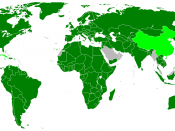Year 11 Legal Studies
Assessment Task 3
Human Rights
1. Distinguish Between
a) Legal, moral and customary rights.
Legal rights are rights that are enforceable by law and people with legal rights usually also need to have legal standing to be recognized by the judiciary. The basis for legal rights in the Australian legal system come from common law and statute law.
Customary rights are rights that are deemed to exist as they have been practiced for long periods of time and are accepted by a group. Customary rights can be enforced under law in some circumstances. In general, the broad customary rights of a society are reflected in the legal rights of the society. Customary rights differ from legal rights because customary rights are not always recognized by the law, and they do not hold the same level of clarity as legal rights. They can sometimes be ambiguous, and not everyone may be aware of them.
Customary rights are not as discoverable or accessible as legal rights.
Moral rights are those that a particular group believe to be right and just. More often than not, moral rights are reflected in the laws and customs of the society and take roots largely from religious beliefs. Moral rights vary greatly from culture to culture, but there are certain morals that are thought to be universally present. An example of this is that most people would agree that theft is immoral. "In a pluralistic society what people see as their moral right might conflict with others in society or the laws of that society. For example an individual who is opposed to war might well hold it is his or her moral right to refuse to fight." Even though this may be his moral right, it would not be his legal right...



RE: your essay
I thought this was a very good essay. Not only was it interesting and very informative, but I belive it could be useful to me in the future as I am a yr 11 legal studies student and we have only begun ot touch upon the above topics in class. Your essay is what I liek to read - it doesn't bore a person and can also be used as related material and a source of information. Good work
0 out of 0 people found this comment useful.